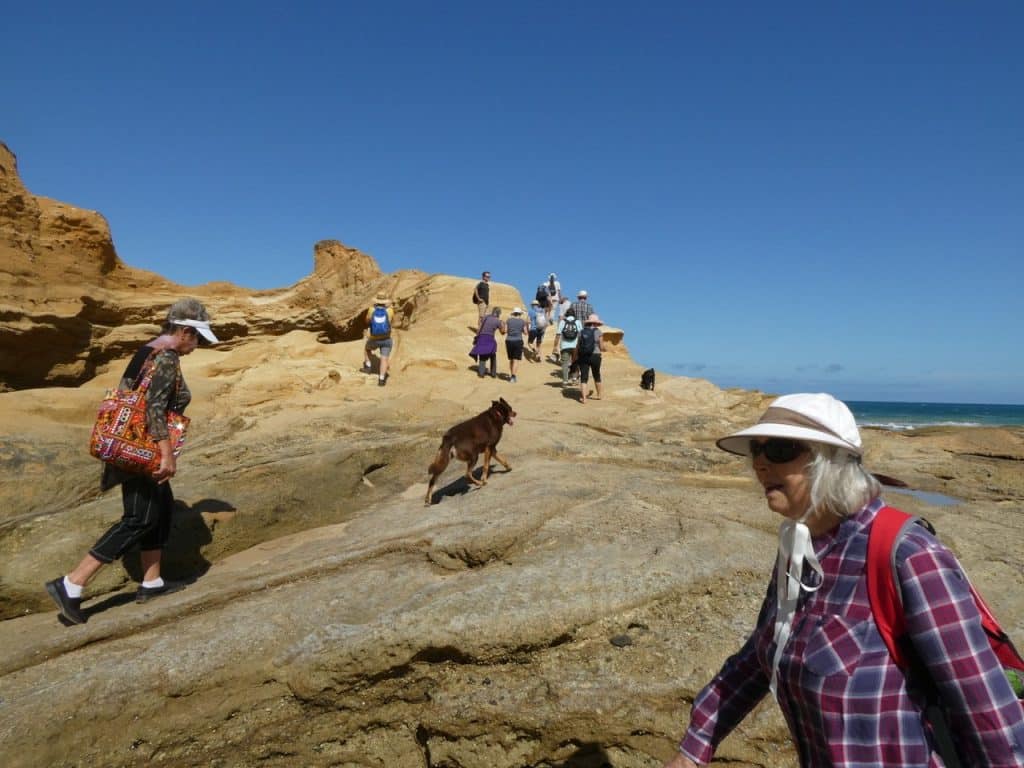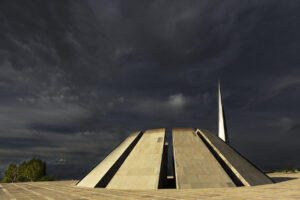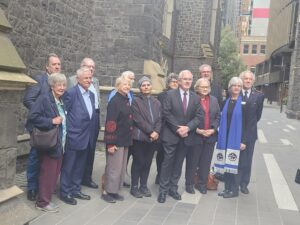
Jenan Taylor
7 March 2023
An ecumenical throng guided by tidal movements, and the sun’s angle across beaches and wind-worn headlands, walked from the Aireys Inlet lighthouse to Urquhart Bluff on the Great Ocean Road, one Sunday in January.
Every few hours ministers, including Surf Coast Anglican vicar the Reverend Sharon Valentino, recited prayer devotions and psalms to the travellers, and a flautist and a ukele player, roused them with hymns.
Uniting church lay minister Wynona Johnson organised the eight kilometre walk to simulate a Camino in Spain, a path or network of paths, typically of 20 kilometres or more, along which pilgrims take a religious journey.
“We’d been talking about doing awe walks through nature, and of doing something spiritual and we wanted to put them together,” Ms Johnson said. “A few of our members had walked the Camino and we thought it would be a good idea if we could do something like that.”
The positive response to their inaugural mini-Camino cemented Ms Johnson’s and Aireys Inlet Uniting church leaders’ decision to organise more of them.
Now, they’re considering making spiritual walks part of their community outreach effort.
Read more: Why this Surf Coast church has no walls
Traditionally pilgrims walked holy roads and visited shrines and places of worship seeking salvation, solace or healing. Today they do the same for perhaps a marginally increased variety of reasons.
Many walk to commune with God in natural surrounds, to slow down, to complete a physical challenge. Some want clarity, or simply the chance to connect with others.
According to several multinational studies, pilgrimages with their low impact, rural focused approach became very attractive to travellers because of the COVID crisis.
The researchers suggest that the pandemic might have played a huge role in the current boom in spiritual travel.
El Camino de Santiago statistics indicate that more than 430,000 compostelas, certificates of accreditation for those who have completed the Camino, the highest number ever recorded, were issued in 2022.
The regional government of Galicia, Spain, also estimated that more than 700,000 individuals had made their way along the area’s sacred routes in the last year.
Raw Travel an Australian operator that organises European and local Camino trips says that post the pandemic restrictions, more people have become inclined to want to experience pilgrimages together.
Read more: Forever young, Surf Coast gran awarded Australia Day honour
Camino manager Sue Chater said that while there were individuals who still sought solo travel, parties of four, five and six people wanted to meet up.
Reconnecting with old friends and family, or forming new, meaningful relationships with a wider range of people from many different backgrounds, seemed to be a prime consideration for those booking European Camino walks.
“Everyone’s come from all around the world with so many different motivations. But everybody’s going the same way, and in a sense, doing the same kind of thing. It’s a unique experience, which is really attractive to people and really gets under people’s skin,” Ms Chater said.
International pilgrim routes representing an assortment of religions have also experienced high interest from visitors in recent years. These include Japan’s Kumano trail and Sri Lanka’s Adam’s Peak.
Of course, Australians don’t have to go far for spiritual travel.
Domestic routes include a walk in Western Australia that unspools from Subiaco to New Norcia, and the Aussie Camino trail that runs from Portland in Victoria to Penola in South Australia.
Nearer to Melbourne, Pallotti College offers people of all denominations a chance to immerse themselves in a walking faith community for three days.
Read more: On divisive issues, we should heed Paul’s advice on meat and vegetables
Organiser Helen Lucas says travellers on the 65-kilometre Pallotine Camino get to experience some of the pilgrim elements that are universal to all Caminos.
“They will sign the pilgrim register at the start of the Camino at St Christopher’s. They will be given their credential and have it stamped each day. They will be given a certificate at the end to say they have completed the Camino,” Ms Lucas said.
The idea of pilgrimage is so attractive that at the sold-out Aussie Friends of the Camino conference in mid-February, people were happy to be waitlisted to partake in discussions and reminiscences about Caminos, or to find more information to plan their own trips.
But AFOTC chairman Janet Leitch said that what made a pilgrimage a life changing experience for many people might be related to the distance of the walk and the increased chances for transformation, as a result.
“For many people, walking a Camino might start as an adventure, but it changes and becomes a spiritual journey. For those who walk further, it’s more likely to become a pilgrimage,” Ms Leitch said. “But it’s not necessarily religious.”
Ms Johnson believes members of the Surf Coast churches would be interested in a longer walk, but sees no reason for the trek to be particularly arduous.
Conscious of those in her congregation who weren’t up to walking too much, Ms Johnson said future Surf Coast Uniting church Caminos would aim to be clearer about the slow, purposeful nature of the sacred walk so that everyone would feel able to take the opportunity to try one.
She also said there might not necessarily be a heavy emphasis on religion in their spiritual walks if the aim was to include members of the wider community.
“But we would want to at least show perhaps the flavour of that, that spending time in a meaningful way in nature gives us a connection with God,” Ms Johnson said.
For more faith news, follow The Melbourne Anglican on Facebook, Twitter, or subscribe to our weekly emails.







